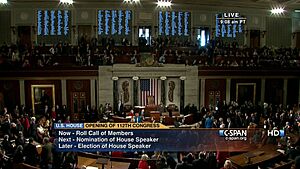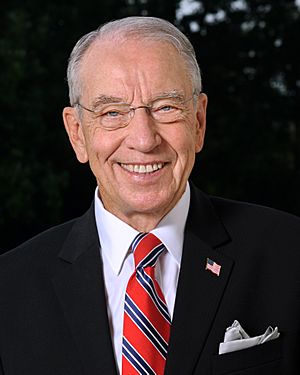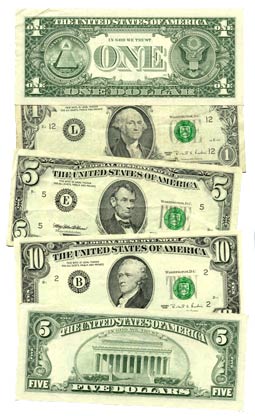Article One of the United States Constitution facts for kids
Article One of the U.S. Constitution sets up the lawmaking part of the federal government. This part is called the Congress. Congress has two main parts: the House of Representatives and the Senate. This two-part system is called bicameral.
Article One explains how Congress is put together, what powers it has, and what it cannot do. It also describes some limits on the states.
Contents
Congress's Lawmaking Power
The Constitution says that only Congress has the power to make federal laws. This is a very important idea. Other parts of the Constitution give the President the power to carry out laws and the courts the power to explain laws.
This system creates a "separation of powers" among the three parts of the government. It means that Congress makes laws, the President makes sure they are followed, and the courts decide what the laws mean in different situations. This helps to keep any one part of the government from becoming too powerful.
Congress also has the power to investigate things. This means they can look into problems or issues to help them make better laws. The Supreme Court agreed with this power in 1927.
The House of Representatives
The House of Representatives is one part of Congress. Its members are chosen by the people of each state every two years. To vote for a Representative, you need to be eligible to vote for the largest part of your state's own legislature.
Who Can Be a Representative?
To be a Representative, a person must meet three rules:
- They must be at least 25 years old.
- They must have been a U.S. citizen for at least seven years.
- They must live in the state they represent when they are elected.
How Representatives Are Counted
The number of Representatives each state gets depends on its population. This is called "apportionment." To figure out the population, a census (a count of all people) is done every ten years.
When the Constitution was first written, the population count included "free Persons" and three-fifths of "all other Persons" (which meant enslaved people). It did not count Native Americans who were not taxed. This was known as the Three-fifths Compromise. It helped decide how many Representatives each state would have and how much tax each state would pay.
Over time, several amendments changed how people are counted and who can vote:
- The 14th Amendment removed the three-fifths rule. It said everyone should be counted, no matter their skin color.
- The 16th Amendment separated direct taxes from population counts.
- The 19th Amendment allowed women to vote.
- The 26th Amendment lowered the voting age to 18.
None of these changes affected how Representatives are divided among the states. Since 1929, the House has had 435 seats.
Filling Vacancies
If a Representative's seat becomes empty, the state's leader (the Governor) must call a special election to choose a new Representative. The Governor cannot just appoint someone temporarily.
The Speaker and Impeachment
The House of Representatives chooses its own leader, called the Speaker. The Speaker is usually a member of the House.
The House also has the special power of impeachment. This means the House can bring charges against a federal official, like the President, for serious wrongdoing. It's like a grand jury deciding if there's enough evidence for a trial. This power has been used rarely. Three Presidents have been impeached: Andrew Johnson, Bill Clinton, and Donald Trump.
The House's Judiciary Committee usually starts the impeachment process. If the House votes to impeach, then the official goes to trial in the Senate.
The Senate
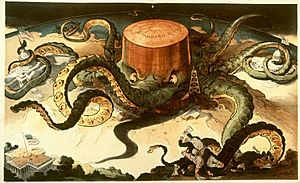
The Senate is the other part of Congress. Each state has two Senators, no matter how big or small its population is.
How Senators Are Chosen
Senators serve six-year terms. Originally, state legislatures chose Senators. But in 1913, the 17th Amendment changed this. Now, the people of each state directly elect their Senators.
Filling Vacancies
About one-third of the Senate seats are up for election every two years. This means the entire Senate is never up for election at the same time. If a Senator's seat becomes empty, the state's Governor can appoint a temporary Senator until a special election can be held.
Who Can Be a Senator?
To be a Senator, a person must meet these rules:
- They must be at least 30 years old.
- They must have been a U.S. citizen for at least nine years.
- They must live in the state they represent when they are elected.
The Vice President's Role in the Senate
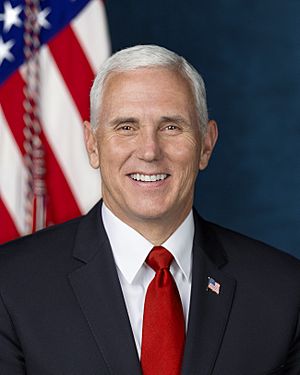
The Vice President is the President of the Senate. The Vice President is not a Senator and usually does not vote. However, if there is a tie vote in the Senate, the Vice President can cast the deciding vote. This happens mostly during important votes.
President Pro Tempore
The Senate also chooses a "President pro tempore of the Senate." This means "President for a time." This Senator leads the Senate when the Vice President is not there. By tradition, the longest-serving member of the majority party usually gets this job.
Impeachment Trials
If the House of Representatives impeaches an official, the Senate holds the trial. The Senators act like a jury. If the President is on trial, the Chief Justice of the Supreme Court leads the trial. To remove an official from office, two-thirds of the Senators present must vote to convict.
If an official is found guilty, they are immediately removed from office. They might also be stopped from holding any other public office in the future. However, the Senate cannot give them any other punishments. The person can still face criminal charges or lawsuits in regular courts.
Congressional Elections
When and How Elections Are Held
Each state's legislature decides how, when, and where elections for Senators and Representatives are held. This includes things like voting times and how to register. However, Congress can change these rules if needed.
When Congress Meets
Congress must meet at least once a year. The Constitution set the first Monday in December as the meeting day, but Congress can choose a different day by law. This rule makes sure Congress can meet even if the President does not call them into session.
How Congress Works
Rules and Quorum
Each part of Congress (the House and the Senate) decides if its members are properly elected and qualified. To do business, a majority of members must be present. This is called a "quorum." If there isn't a quorum, a smaller number of members can still meet and try to get absent members to come.
Making Rules and Punishing Members
Each House can make its own rules for how it works. They can also punish their own members for bad behavior. To remove a member, two-thirds of the members must agree to expel them.
Keeping Records
Both the House and the Senate must keep a record of their meetings, called a "Journal." They publish this Journal, but they can keep some parts secret if needed. If one-fifth of the members present ask for it, the votes of members on a question must be written in the Journal.
Taking Breaks
Neither the House nor the Senate can take a break (adjourn) for more than three days without the other House agreeing. They also cannot meet in a different place than where both Houses usually meet (the Capitol), unless both agree.
Pay, Privileges, and Other Rules
Pay and Legal Protection
Senators and Representatives decide their own pay. However, any change to their pay does not start until after the next election.
Members of Congress have special protections while doing their job. They cannot be arrested while attending, going to, or returning from Congress, except for very serious crimes like treason. They also cannot be sued or charged with a crime for anything they say during a debate in Congress. This helps them speak freely.
No Other Government Jobs
A Senator or Representative cannot hold another job in the executive branch (like working for the President) at the same time they are in Congress. This rule helps keep Congress independent and prevents the President from influencing votes by offering other jobs.
How Bills Become Laws
Money Bills
All bills that are about raising money (like taxes) must start in the House of Representatives. However, the Senate can suggest changes to these bills, just like any other bill. This rule comes from an old English practice to make sure that the part of the government closest to the people (the House) controls money matters.
From Bill to Law
When a bill passes both the House and the Senate, it goes to the President.
- If the President approves it, they sign it, and it becomes a law.
- If the President disapproves (vetoes) it, they send it back to the House where it started, explaining why.
* If two-thirds of that House votes to pass the bill again, it then goes to the other House. * If two-thirds of the second House also votes to pass it, the bill becomes law, even without the President's signature. This is called "overriding a veto."
- If the President does not sign or return the bill within ten days (not counting Sundays), it becomes law automatically.
- However, if Congress takes a break (adjourns) before the ten days are up, and the President has not signed the bill, it does not become law. This is called a "pocket veto." Congress cannot override a pocket veto.
Any other order, resolution, or vote that needs both the House and Senate to agree (except for taking a break) must also go to the President. This means the President has a say in most decisions made by Congress.
Powers of Congress
Congress has many important powers listed in the Constitution. These are called "enumerated powers."
Key Powers of Congress
- Taxes and Spending: Congress can collect taxes, duties, and other fees to pay debts and provide for the country's defense and general well-being.
- Borrowing Money: Congress can borrow money for the United States.
- Regulating Commerce: Congress can control trade with other countries, among the states, and with Native American tribes. This power has been interpreted very broadly over time.
* For example, in the early 1800s, the Supreme Court said that "commerce" included things like shipping goods. Later, in the 1900s, the Court allowed Congress to regulate things that seemed local but had a big effect on trade across states. * However, in recent years, the Supreme Court has put some limits on this power, saying that Congress cannot regulate everything, especially if it doesn't directly affect the economy.
- Naturalization and Bankruptcy: Congress can set rules for how people become U.S. citizens (naturalization) and for bankruptcy.
- Money and Measures: Congress can coin money, decide its value, and set standards for weights and measures. They can also punish people who make fake money.
- Post Offices and Roads: Congress can set up post offices and roads for mail delivery.
- Copyrights and Patents: Congress can give authors and inventors copyrights and patents for a limited time. This helps promote science and art.
- Courts: Congress can create courts that are lower than the Supreme Court.
- Crimes: Congress can define and punish crimes like piracy on the high seas and other crimes against international law.
- War and Military:
* Only Congress can declare war. The U.S. has declared war five times. * Congress can raise and support armies and a navy. However, money for the army cannot be approved for more than two years at a time. This was to prevent a powerful standing army during peacetime. * Congress makes rules for the military. * Congress can call forth state militias (like the National Guard) to enforce laws, stop rebellions, or defend against invasions. States still appoint the officers and train the militia.
- Governing the Capital: Congress has special power to make laws for the nation's capital, District of Columbia. They can also make laws for land bought from states for forts or other important buildings.
The "Necessary and Proper" Clause
Congress also has the power to make all laws that are "necessary and proper" for carrying out its other powers. This clause is very important because it allows Congress to do things that are not directly listed in the Constitution but are needed to fulfill its main duties.
For example, the Supreme Court used this clause to say that Congress could create a national bank, even though the Constitution didn't specifically mention banks. This means Congress has "implied powers" that help it carry out its "enumerated powers."
Limits on Congress
The Constitution also places limits on what Congress can do:
- Slave Trade (Historical): Before 1808, Congress could not stop the importation of enslaved people, though it could tax it. This was a temporary rule that ended in 1808.
- Habeas Corpus: Congress cannot suspend the privilege of habeas corpus (the right to be brought before a court to decide if your imprisonment is lawful), except in cases of rebellion or invasion when public safety requires it.
- No Bills of Attainder or Ex Post Facto Laws: Congress cannot pass a "bill of attainder" (a law that declares a person guilty without a trial) or an "ex post facto" law (a law that punishes someone for an act that was not illegal when they did it).
- Taxes: Direct taxes must be based on population (unless it's an income tax, thanks to the 16th Amendment). Congress cannot tax goods exported from any state.
- Trade Preferences: Congress cannot favor the ports of one state over another in trade or tax laws. Ships traveling between states cannot be forced to pay duties in another state.
- Spending Money: Money can only be taken from the U.S. Treasury if Congress has passed a law allowing it. A regular report of all government spending must be published.
- Titles of Nobility: Congress cannot grant any titles of nobility. Also, no U.S. official can accept gifts, money, or titles from a foreign country without Congress's permission.
Limits on the States
The Constitution also limits what individual states can do. This helps keep the federal government strong and unified.
What States Cannot Do
- Treaties and Alliances: States cannot make their own treaties, alliances, or agreements with other countries.
- Money: States cannot coin their own money or issue their own paper money. They can only use gold and silver coins as payment for debts. This ensures a single, stable currency for the whole country.
- Bills of Attainder and Ex Post Facto Laws: States cannot pass bills of attainder or ex post facto laws.
- Contracts: States cannot pass laws that break contracts. This means if people or businesses make a legal agreement, the state cannot pass a law that makes that agreement invalid. This rule helps keep business and agreements stable.
- Titles of Nobility: States cannot grant titles of nobility.
Taxes on Imports/Exports
States cannot tax imports or exports without Congress's permission. If they do, any money collected from these taxes must go to the U.S. Treasury, not to the state.
Troops and Agreements
States cannot keep troops or warships during peacetime without Congress's permission. They also cannot make agreements or deals with other states or foreign countries without Congress's approval. States can only go to war if they are actually invaded or in immediate danger.
However, states can organize and arm their own militias (like the National Guard) as long as Congress sets the rules for them.
Agreements between states sometimes need Congress's approval. The Supreme Court has said that Congress's consent is only needed if the agreement gives states more political power that might interfere with the federal government's authority.
Images for kids
-
The impeachment trial of President Clinton in 1999, with Chief Justice William Rehnquist presiding.
-
Chief Justice John Marshall helped explain the meaning of the Commerce Clause.
See also
 In Spanish: Artículo I de la Constitución de los Estados Unidos para niños
In Spanish: Artículo I de la Constitución de los Estados Unidos para niños


